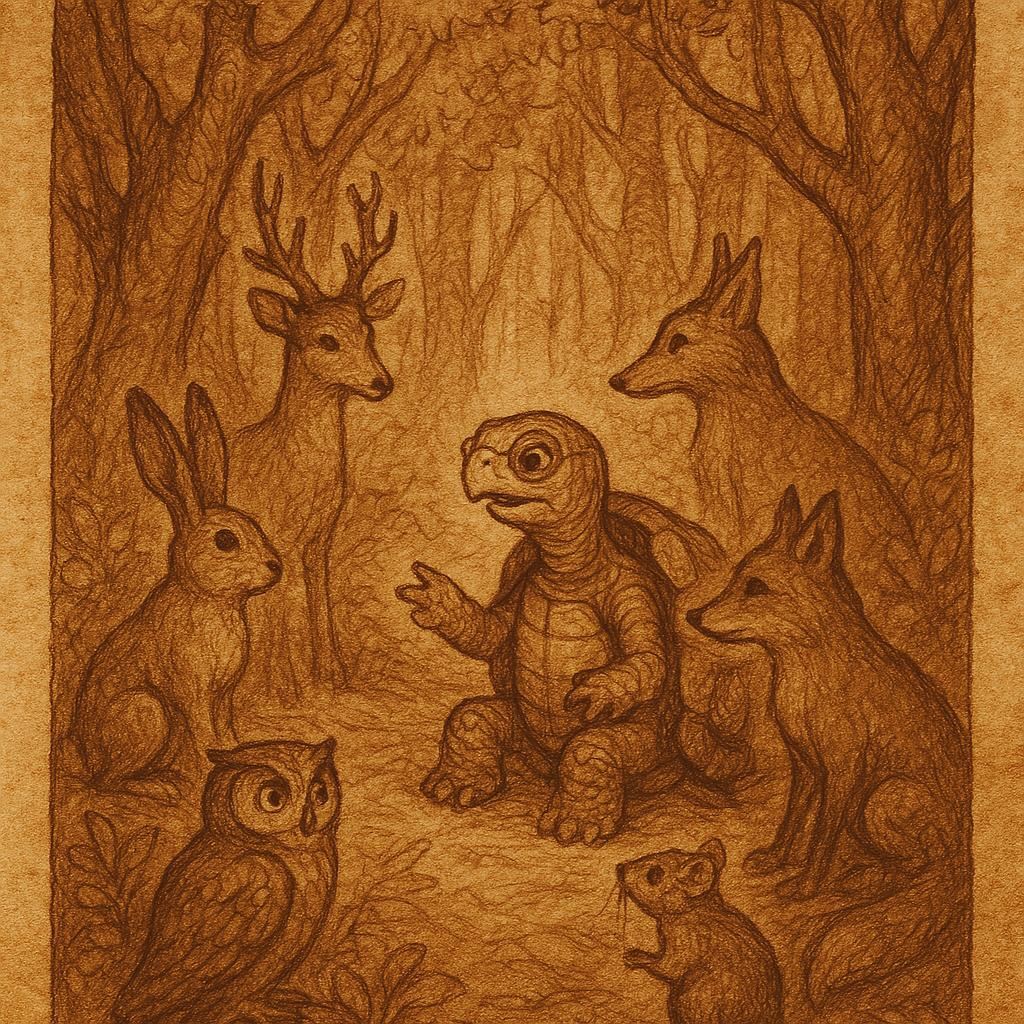In the dense, vibrant forests of the Fang people in Cameroon, life moved with both rhythm and caution. Towering trees stretched high into the sky, their thick leaves forming a canopy that filtered sunlight into shifting patterns of gold and green on the forest floor. Rivers wound silently through the undergrowth, reflecting the bright sky above, while birds called to each other in musical conversation. Among these creatures, the tortoise was known for his patience and cunning. Though slow in movement, he possessed a mind sharp enough to rival even the cleverest of the forest animals.
One day, a gathering of the animals took place in the wide clearing near the river. A disagreement had arisen among them, and the tortoise was eager to involve himself. Always attentive to the behavior of others, he noticed that some of the smaller animals whispered secrets while the larger animals debated loudly, each trying to assert authority. The tortoise, as observant as ever, realized that he did not fully understand all the matters at hand. Yet, he decided to participate in the discussion, hoping to influence the outcome while concealing his own ignorance.
READ THIS: The Treachery of Tortoise
The animals were discussing a matter that concerned the distribution of resources in the forest. Food had been scarce, and each species wanted to ensure that it received enough to survive. The Leopard growled, the Elephant trumpeted, and even the smaller birds and monkeys voiced their opinions passionately. The tortoise, feeling uncertain about some of the details, smiled gently and began to speak, presenting himself as knowledgeable and wise.
“I believe we must consider not only strength but also fairness and care in our decisions,” the tortoise began, his voice calm and steady. “We must ensure that every creature, large and small, is accounted for, and that we act with wisdom rather than haste.” The animals listened, nodding thoughtfully. Yet the tortoise had not understood all the details of the dispute. He realized that if he admitted his ignorance, the other animals might dismiss his advice. Instead, he relied on clever phrasing, general observations, and careful attention to the reactions of others.
As the discussion continued, the tortoise watched how each animal presented arguments. He repeated ideas in his own words, asked questions that prompted the larger animals to clarify their points, and subtly guided the conversation toward solutions that maintained harmony. Even the Leopard, known for his cunning, paused to consider the tortoise’s advice. The tortoise’s ability to conceal ignorance with careful speech and observation impressed all who listened.
Gradually, the forest animals reached a consensus. They agreed to share resources fairly and to support one another during times of scarcity. The tortoise, still standing quietly near the edge of the clearing, had successfully influenced the outcome. He had taught an important lesson without revealing the limits of his knowledge. By listening carefully, asking thoughtful questions, and presenting ideas diplomatically, the tortoise ensured that harmony prevailed.
When the meeting ended, the animals returned to their homes in the forest. Birds sang from the branches, monkeys leaped through the trees, and even the slow tortoises moved with satisfaction. The clever tortoise, having covered his ignorance with wisdom and tact, returned to his burrow with a quiet smile. The lesson he had imparted was clear: intelligence is not always about knowing everything but about using observation, diplomacy, and careful reasoning to guide others.
Moral Lesson
Tortoise Covers His Ignorance teaches that wisdom often lies in careful observation, tact, and thoughtful speech. One does not need to know everything to guide others effectively. By listening attentively, asking questions, and presenting ideas diplomatically, it is possible to influence outcomes positively and maintain harmony. The story reminds us that cleverness combined with humility and patience can achieve what force or arrogance cannot.
Knowledge Check:
Why did the tortoise participate in the forest meeting despite not knowing all the details?
The tortoise wanted to influence the outcome while hiding his ignorance, using cleverness and tact instead of admitting uncertainty.What issue were the animals discussing in the forest?
The animals were debating the fair distribution of resources during a time of scarcity.How did the tortoise guide the discussion without full knowledge?
He asked thoughtful questions, rephrased ideas, and presented general advice to steer the conversation toward harmony.What lesson did the forest animals learn from the tortoise’s approach?
They learned that careful observation, diplomacy, and tact can resolve disputes more effectively than arrogance or force.Why was the tortoise’s method considered clever?
Because he influenced the outcome successfully while concealing his own ignorance, demonstrating intelligence in action.How does this folktale reflect the values of the Fang people?
It highlights the Fang appreciation for intelligence, observation, patience, and the importance of maintaining harmony within the community.
Cultural Origin: Source: Fang folktale, Cameroon. Recorded by Robert H. Nassau in Where Animals Talk: West African Folklore Tales (1914).






